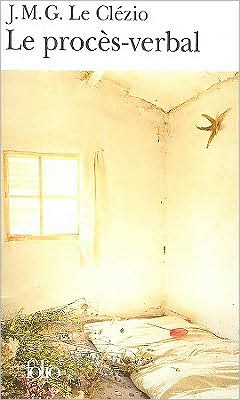

 |

|

The average rating for Le Proces-Verbal based on 2 reviews is 3 stars.
Review # 1 was written on 2018-12-23 00:00:00 James Dunevent James DuneventTo over-describe is to defamiliarize the reader with the thing described. (Conversely, to under-describe can allow the reader more cognitive room to fill in the blanks.) Done well, as here early on, over-description sets the reader squirming. The effect is a little like chalk misapplied to a blackboard. See Russian Formalism. There's a fine example of the technique early in Charlotte Bronte's Villette, when a painting in a gallery is described. The protagonist here may be mad, so his hyper vigilance to setting, atmosphere, his and others' bodies, grates even when softened by way of third-person narration. It's an admirable way to begin.Adam watched them absentmindedly as though they, their noise and movement, had no logical connection with himself; and every sensation of his overwrought body, which magnified details, fashioned his being into a monstrous object, a compact of pain, in which consciousness of life was merely consciousness of matter through the nerves. (p.14) Adam has avoided working life, the rat race, it appears, so he might indulge himself in a constant welter of sensory, phenomenological experience. He's drunk on his sensations. Thus, the use of defamiliarization. It occurs to me that this is very much a young man's novel, filled with the knowledge gleaned in college, and marked by a shrewd talent that allows the author to place a few of these ideas in juxtaposition, which in turn function as a clever narrative engine. Impressive. Adam's sensibility is wholly solipsistic. He's alienated from the social so that he is incapable of giving, so busy is he greedily sucking up bodily sensations. He's cruel to animals as all true dyed in the wool serial killers are. He's just ruthlessly fucked a young woman; she hasn't been seen since; did he kill her? Adam, in short, is a bore, but the prose is not. The novel reminds me of Lolita in this sense, it's the story of an obnoxious figure whose prose seeks to be of such overwhelming interest that we excuse, forget, overlook the character's loathsomeness. Humbert Humbert's was a libertine, greedy for illicit sexual pleasures, self-satisfactions, for humiliating others as a means ego inflation, and for skirting the law. That's all here in The Interrogation, though Adam's greed is for a deep form of internalized experience. What drives Adam is reflection, lucid meditation. Starting from his own human flesh, from the sum of his present sensations, he annihilates himself by a dual system of multiplication and identification. (p. 154) As the book crawls to its finish, Adam disappears and the novel fragments into a number of discreet stories: the drowned man, the woman in the photographic negative, etc. Then we flashback to Adam at age 12, and move on to a turgid bit of pataphysics. A favorite sentence: "All the components of the telephone are present in the rhinoceros." (p. 153) The device of a torn up notebook is used, written in at some point by grownup Adam, thus the text is even further fragmented. Eventually Adam evolves, perhaps inevitably, from squatter and general cynic to ebullient street-corner prophet. There are many ways to go insane on the page. Two of my favorites are Elena Ferrante's The Days of Abandonment and Alberto Moravia's Contempt. The Interrogation isn't on that exalted level, but it holds the reader and stays lodged in memory. That is a difficult task for any writer. Recommended. |
Review # 2 was written on 2012-10-09 00:00:00 KHALIL MAHDI KHALIL MAHDIOne of the Worst Novelists to win the Nobel Prize After Bob Dylan's Nobel Prize there has been a lot of writing about writers who were never awarded the Nobel, and about how political the prize has often been. It's also illuminating to consider writers will have gotten the prize but haven't stood the test of time. There have been some astonishingly poor choices over the years. This book, and this author, are irredeemably poor. If you think this is an expressive conjuring of the mental state of a disturbed young man, if you think this is a fair representation of tortured imagination, you should read Schreber's "Memoirs of My Mental Illness," or Artaud, or Genet, or Burroughs, or anyone! Read Emil Nolde's Memoirs, read something by A.L. Kennedy, read anything! Le Clezio writes whatever comes into his head at any moment. There are some sustained passages in which he is imagining something from one point of view, as one experience -- there's a chapter about a rat, and one about a dead man washed up on a beach -- but he continuously interrupts himself with random notions, names, places, and ideas. He seems to think this is how novels work, and he may also think this is how abnormal mental states feel. It is childish, in the bad sense of that word. And the Nobel Prize: clearly, it is evidence that for some people, this kind of scattered, adventitious, random, opportunistic bricolage is an adequate representation of states of consciousness. Such people have apparently never experienced real depths of imagination. It is tremendously sad to think of that. |
CAN'T FIND WHAT YOU'RE LOOKING FOR? CLICK HERE!!!